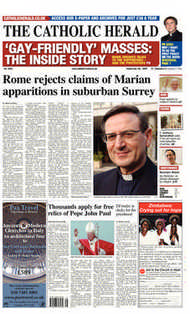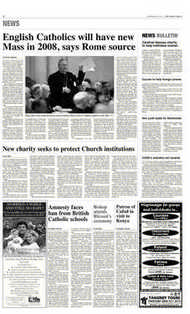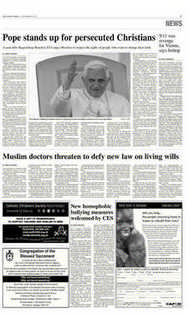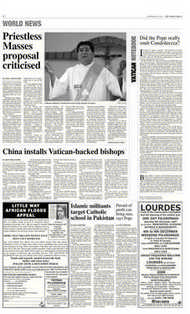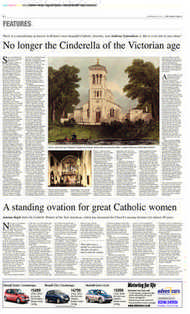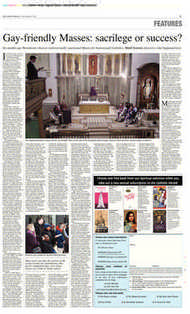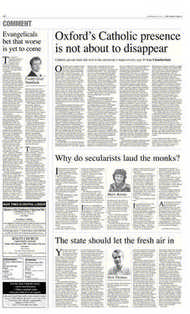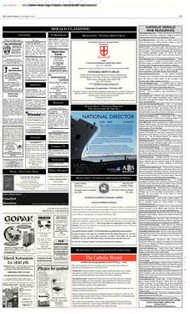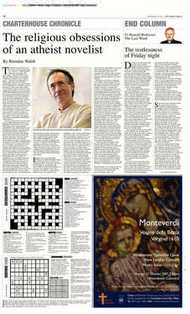Page 4, 28th September 2007
Page 4

Report an error
Noticed an error on this page?If you've noticed an error in this article please click here to report it.
Tags
Share
Related articles
New Bishop Offers Hope For Healing In China
Vatican Agrees Ordinations With China
Rome Censures China
Relations With Beijing On Knife Edge As New Cardinal Is...
Illicit Consecrations Fail To Darken Hope
Peking Takes A Swipe At 'despot Pope'
China installs Vatican-backed bishops
BY JOHN THAVIS IN ROME
THE VATICAN has described the ordinations of two Chinese bishops in communion with Rome as a positive sign for the Church that raised hopes of further appointments.
The comment came in an article in the Vatican newspaper, L’Osservatore Romano, which reported the ordination of Bishop Joseph Li Shan as head of the Diocese of Beijing, the Chinese capital.
The two-hour ordination liturgy, attended by hundreds of local Catholics and a number of government officials, followed the ordination of Coadjutor Bishop Paul Xiao Zejiang of Guizhou, China, earlier in September. The newspaper indicated that both ordinations had been carried out with the approval of Pope Benedict XVI.
The local Catholic communities, who elected the bishops, had indicated to the Vatican that they were worthy candidates, the newspaper said.
At Bishop Li’s ordination there was no announcement of Vatican approval.
At the Vatican, Archbishop Fernando Filoni, an assistant secretary of state, told reporters that Bishop Li’s nomination was a significant step forward in Vatican-Chinese relations.
“Undoubtedly this is a positive sign. Let’s hope it continues,” Archbishop Filoni said.
“We hope it is the first page of a long chapter, of a new reality in Church-state relations in China,” he said.
In Beijing, Fr Sun Shang’en, diocesan spokesman, told the press: “If the Vatican approves Bishop Li, we are happy and welcome it, but we have not yet seen the apostolic bull from the Vatican.” Bishop Xiao’s diocese is based in Guiyang, the capital of Guizhou province. In 1999 Catholic officials registered with the government merged the Anlong, Guiyang and Shiqian dioceses to form the Guizhou diocese, which covers the whole province.
It has about 100,000 Catholics, mostly scattered in extensive mountainous areas, with 25 priests and about 30 nuns serving them. L’Osservatore Romano noted that the principal consecrating bishops at both ordinations were in communion with Rome but said some of the co-consecrators were not – a “cause of regret,” it said.
“In entrusting the difficult mission of these two young bishops and their diocesan communities to the Virgin Mary, there arises the spontaneous hope that all the dioceses can have worthy and qualified pastors, capable of living in full communion with the Catholic Church and with the successor of Peter, and of announcing the Gospel of Jesus Christ to the Chinese people,” it said.
The article noted that Pope Benedict, in his recent letter to Chinese Catholics, had called for a “respectful dialogue” between Church and state authorities, and added: “Catholics in China and in the rest of the world are praying so that this may become a reality.” The Vatican’s comments added to speculation that the two ordinations mark the beginning of a new and improved stage in Sino-Vatican relations.
The Rome-based missionary news service AsiaNews quoted a Chinese source as saying the Beijing government was no longer imposing its own candidates as bishops and was now allowing the Church more freedom.
In his letter to Chinese Catholics Benedict XVI said that the Vatican “would like to be completely free to appoint bishops”.
blog comments powered by Disqus


